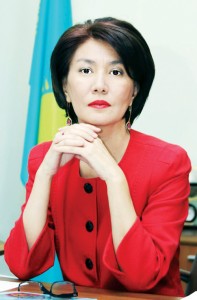Kazakhstan President Nursultan Nazarbayev’s recent interview with Khabar TV at the foothills of Ulytau, a sacred mountain in Kazakh lore, covered a broad and in-depth list of topics critical to the country.
 In the interview, it was made clear that Kazakhstan will stay the course on its domestic and foreign policy. In answering a reporter’s question about concerns surrounding the creation of the Eurasian Economic Union (EEU), the President noted that all the talk about the disadvantages of Kazakhstan’s participation in the EEU is a manifestation of dilettantism. The President stressed that the establishment of the economic community of the three countries has already caused a marked decrease in delivery costs for goods shipped throughout the union’s territory and therefore, Kazakh products have become more competitive in the global market.
In the interview, it was made clear that Kazakhstan will stay the course on its domestic and foreign policy. In answering a reporter’s question about concerns surrounding the creation of the Eurasian Economic Union (EEU), the President noted that all the talk about the disadvantages of Kazakhstan’s participation in the EEU is a manifestation of dilettantism. The President stressed that the establishment of the economic community of the three countries has already caused a marked decrease in delivery costs for goods shipped throughout the union’s territory and therefore, Kazakh products have become more competitive in the global market.
“The EEU is an exclusively economic union, not a political one: all member countries have an equal voice, everything will be decided by consensus,” President Nazarbayev stressed. Besides, Kazakhstan will always have the right to withdraw its participation from the union if it feels its sovereignty is being threatened. In general, the union has many pros and “there are no real arguments against it.” In addition, the strengthening of trade and economic relations with neighbouring countries will strengthen our security, as it is beneficial for the trading partners that the situation remained stable on their territory.
The EEU is one of President Nazarbayev’s personal projects. He conceived the idea and promoted it himself; the EEU is his child, the fruit of his intellectual reasoning and political efforts. The implementation of the EEU as an economic union enforces consistency in the Eurasian integration process.
Against a background of geopolitical shocks, Kazakhstan demonstrates tranquility and adheres to the principles of good-neighbourliness and cooperation. This is due to the fact that the leadership of Kazakhstan has adopted a strong model of national development based off of positivity and inclusivity. Kazakhstan, headed by President Nazarbayev, has carefully avoided conflict during negotiations and seeks harmony. Therefore, the political rhetoric in the country is much thinner; [the rhetoric] includes symbols and a thin elegant political game with an end goal of retaining independence and the capacity of new resource development and competitiveness.
“Those who do not want to understand it will not understand,” the President noted in the same interview, giving the following example, “Kazakhstan is located in the centre of the continent. We have no access to the sea. The price of building a two-story house in Kazakhstan is that of building 10 houses in Malaysia. These countries are located by the sea and shippers can easily load goods onto ships and sail them for a very low price. Copper is exported from trains out of Karaganda and Zhezkazgan; fare is determined per kilometre until the load reaches the shores of the Black sea. Our ‘sea’ is Russia. Our ‘sea’ is China. If we figuratively consider these two countries to be seas, we are on their shores. If we do not trade with them, how will our economy grow? Therefore, establishing economic relations with close neighbours is inevitable and vital for us,” President Nazarbayev concluded.
Another important message in the Ulytau interview was the development of inland regions. Kazakhstan’s border areas are generally more developed than its interior, which is often merely transited. That was before the railway lines from Shubarkol to Zheskazgan and Beineu were built. Vital roads lie along inland areas. Kazakhs were happy about the opening of rail links through Khromtau, which provided a straight path from the northern regions to the west and through the station Shar in the East Kazakhstan region, which shortened the route from Almaty to Oskemen.
The direct railway line from the agricultural regions to the Caspian ports is now open; this shortens the route by one day. This is a great achievement and is part of a global project to revive the Great Silk Road. Huge swaths of central Eurasia have been transformed into a modern-day embodiment of this road. Between this project and the 2,000-kilometre Kazakh segment of the Western Europe-Western China road, large amounts of goods will traverse our country.
This is the strategic vision of President Nazarbayev when Kazakhstan and Central Asia will no longer be considered the backyard of the world trade routes.
The author is the director of the Institute of Philosophy, Political Science and Religious Studies of the Committee of Science of the Ministry of Education and Science of Kazakhstan and a corresponding member of the National Academy of Science of Kazakhstan.
